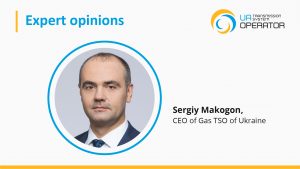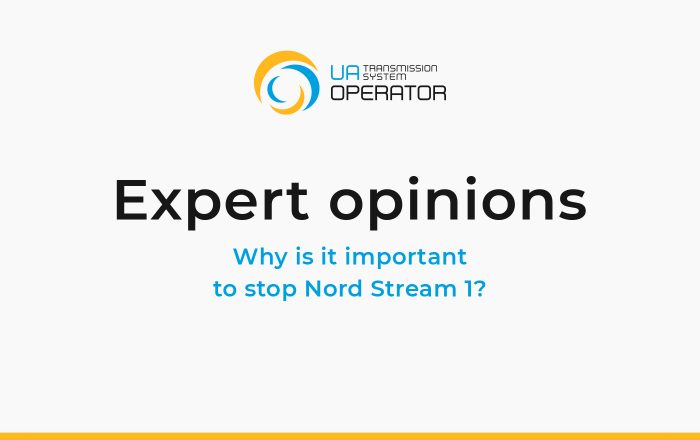The Gas TSO of Ukraine continues to publish expert opinions on topical issues. This time we asked experts about the possibility of a complete halt in the transportation of russian gas to the EU through the Nord Stream-1 gas pipeline. After all, while discussions continue in the EU, russia is already using blackmail to influence the European gas markets, Poland and Bulgaria, testing the stability and unity of the EU. Therefore, would it be advisable for the EU at the first stage to abandon the transportation of russian gas by Nord Stream-1 and other bypass gas pipelines, and why?
Despite a full-scale war, russia is interested in keeping gas transportation to the EU countries in the contracted volumes, at least as of now, – says Olena Pavlenko, President of DiXi Group. Nord Stream-2 has been completely halted, Yamal-Europe has actually been halted, and other gas pipelines are offshore and cannot provide flexibility in transportation. At the same time, Nord Stream-1 almost every year in August undergoes scheduled repairs.

“The more gas will be transported by the Ukrainian territory, the more cautious will be russia’s actions on the Ukrainian gas pipeline system. For Ukraine, this could mean more “safety grounds” on its territory. For the EU countries, the redirection of russian gas through the territory of Ukraine can also be beneficial. Firstly, it is an opportunity for Ukraine to get more funds for transportation and use them to improve its financial situation (where the EU is also investing). Secondly, this is another way to help Ukraine reduce the level of russian aggression. Thirdly, it is an opportunity to preserve the route along which, in the future, it may be possible to transport gas not only from russia, but from the countries of Central Asia, and thereby diversify the sources of gas supplies to the EU,” – says Olena Pavlenko.
The EC and the EU are determined to phase out the Russian gas in the next 5-8 years. This means at least two things – that the Russian gas will be imported for some more time and that the transit routes need to be rearranged. The routes may be agreed among the EU Member States, including the Energy Community Contracting Parties, – said Predrag Grujicic, Energy Community Secretariat, Head of Gas Unit:

«Indeed, phasing out the transit of the Russian imports via Nord Stream 1 and transferring these quantities to the Ukrainian route would represent an act of solidarity of the EU towards Ukraine which should be welcome by all means. That would secure more income for the Ukrainian gas transmission operator, and deservedly so».
European partners are now aware that the situation threatens the security of gas supplies to the EU countries because Europe plans to refuse russian gas. However, if not all EU countries will be able to decline at the same time, then we propose that the Ukrainian gas transmission system should be the last delivery route, and Nord Stream-1 should be the first to be disconnected,” – said Sergiy Makogon, General Director of GTSOU.

“It is already possible today to completely stop transit through Nord Stream-1 without a significant impact on consumers, and the Ukrainian and Polish GTS can temporarily transport the necessary volumes, which will significantly strengthen the security of our gas pipelines and weaken the position of the kremlin,” – he said.
«That would be definitely efficient expedient for the EU, serving several aims at the same time. Even before 24 February 2022, the EU’s dependence on Russian gas was often questioned and solutions to decrease it has been considered, with varying degrees of success across various regions,» – agrees Karolina Chegir, senior gas expert at Energy Community Secretariat.

The expert thinks that after 24 February it became clear how this dependence threatens the EU energy sectors and overall economies. It became also clear that this dependence has to be resolved as soon as possible and by all means. And it became unfortunately also clear that Europe cannot give up of all Russian gas immediately, that decrease can be done only in stages, taking years. To opinion of Karolina Chegir the certain decrease in imports can be done immediately in a synchronized manner, at the EU level, by a common agreement.
«There are only several main routes of Russian gas supply to Europe: Nord Stream, Yamal, Ukrainian network, Turkish Stream, and LNG. It is the easiest to cancel Russian LNG (due to the smaller share in total LNG supply and possible replacement), Yamal does not play a big role in recent years, the Turkish Stream supplies mainly the Balkan countries. Nord Stream and transit via Ukraine bring the biggest gas volumes of Russian gas to Europe and both supply Central Europe. It could be easily seen that abandoning supply via Nord Stream-1 will not jeopardize the security of gas supply, all volumes could be compensated via Ukraine. Having in mind the vast capacity of the Ukrainian network, that would be possible even in the conditions of increased imports than is right now, not to mention in the conditions aimed to decrease the supply of Russian gas. If all imports of Russian gas via North Stream are transferred to the Ukrainian network, this will increase income to Ukrainian TSO, which can be considered as direct support of the EU to the Ukrainian economy, but not needed to be paid by the EU. This would also increase the importance of the Ukrainian network for Russia, eager to ensure income from gas export, i.e. it would serve as a safety guarantee for transmission infrastructure», – she said.
Indeed, there is still no consensus in the EU on the refusal of russian gas, and discussions continue. Recall that on April 7, the European Parliament called for an immediate and complete embargo on the import of all russian energy sources – oil, gas, coal, nuclear fuel, as well as completely abandoning Nord Stream-1 and Nord Stream-2. The relevant resolution also referred to the provision of a plan to ensure the security of energy supplies to the EU in the short term. Therefore, the issue of stopping the use of russian bypass gas pipelines is already on the European agenda, – draws the attention Mykhailo Gonchar, President of the Center for Global Studies.

“We need to push the Brussels bureaucracy to the actions outlined by the European parliamentarians. The further use of russian streams still contradicts the achievement of climate neutrality goals and generates risks of an artificial accident. As it turns out, the quality of work performed in the Arctic conditions of the Yamal gas connecting pipelines to streams (Bovanenkovo – Ukhta) is low, which is why the gas pipelines floated from the seabed in the Baidaratskaya Bay in Yamal. Therefore, the termination of their use also has purely technical expediency. The EU will not feel any discomfort by abandoning bypass gas pipelines since there is a traditional reliable and powerful route through Ukraine,” – stressed the President of the Center for Global Studies.
Russian gas imports have already fallen ten percentage points, to about 30% of total EU imports. They have been overtaken by LNG and Norwegian purchases in recent months, – comments Aura Sabadus, Senior energy journalist, ICIS. However, the diversity of the internal needs of European countries, depending on the geographical location, the availability of the necessary infrastructure, and historical background, does not yet allow radical decisions to be made. If the volumes of gas from the Turkish Stream, Nord Stream-1 are redirected to the Ukrainian direction, this, first of all, will partially compensate for the significant losses caused to Ukraine by russia.

“While countries which currently depend on inflows from Nord Stream 1 may expect to replace some if not all volumes elsewhere, those further to the east would need Russian gas until they are in a position to find or increase replacement sources such as Black Sea and Caspian Sea gas or LNG imported via Greece, Turkey or Croatia. This means that Ukraine could transit some, if not all of the 55bcm shipped annually via Nord Stream 1. In the latter scenario, Ukraine could add $ 1,375bn in transit fees”, – says Aura Sabadus.
However, the agreement should be temporary, the expert said, and Ukraine should make efforts to rethink its energy security strategy to ensure severance of any relations with russia, increase domestic production, new regional transit corridors and transition to a modern, decarbonized economy, in full compliance with European goals.
Restrictions on gas transportation via Nord Stream-1 are not the equivalent of a partial or complete embargo. It can be a separate measure within the sanctions, as Gazprom will have the possibility to increase gas transportation through the Ukrainian GTS or the Yamal-Europe gas pipeline,” explains Oleksiy Yaroshenko, head of GTSOU Strategy Unit.
“Such a step will have several additional consequences:
– It will increase the importance of the Ukrainian GTS for both the EU and russia, which will strengthen Ukraine’s negotiating position;
– will limit Gazprom’s ability to increase supplies to the European market. In this way, alternative suppliers, who decide to increase production, could be confident in demand for their products;
– will increase Gazprom’s financial costs, thus reducing its ability to finance the war in Ukraine,” said Oleksiy Yaroshenko.
